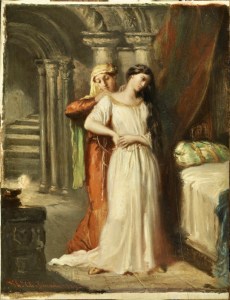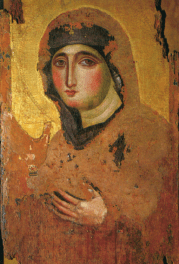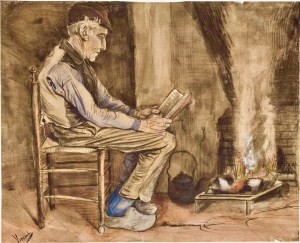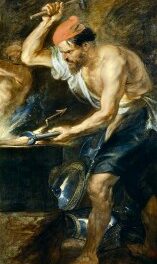We support our Publishers and Content Creators. You can view this story on their website by CLICKING HERE.
Shakespeare’s sisters come in all shapes and sizes, good, bad and ugly. So do his men. He believed in the mystical equality of the sexes and the inherent dignity of the human person because he knew that all men and women are made in the image of God.
 It’s almost a century since Virginia Woolf wrote “Shakespeare’s Sister” in which she presented the plight of an imaginary sister of Shakespeare who is thwarted because of her sex from emulating her brother’s literary success. Frustrated by the lack of literary opportunity and finding herself pregnant, she does the only sensible thing that a woman can do in such circumstances. She commits suicide.
It’s almost a century since Virginia Woolf wrote “Shakespeare’s Sister” in which she presented the plight of an imaginary sister of Shakespeare who is thwarted because of her sex from emulating her brother’s literary success. Frustrated by the lack of literary opportunity and finding herself pregnant, she does the only sensible thing that a woman can do in such circumstances. She commits suicide.
In this foundational feminist critique of the plight of women, Woolf contrasts the presentation of powerful women in literature with the lack of powerful women in history, focusing particularly on Shakespeare’s time. It is intriguing that the literary icons from Shakespeare’s corpus whom Woolf singles out for praise as empowered women are Cleopatra, Lady Macbeth, Desdemona and Rosalind. Let’s look at this Shakespearean sisterhood, examining what Woolf might have seen in them as representing strength or what might now be called empowerment.
Cleopatra forsakes her responsibilities to her family and people in her destructive and self-destructive lust for Antony, and she commits suicide in spite of Caesar’s warning that he would have her children killed should she kill herself. Lady Macbeth is so intent on political empowerment that she proclaims that she would be willing to violently slaughter her own nursing baby to become queen. Desdemona is so deluded by Othello’s boastful lies that she elopes with him, knowing nothing of Othello’s true character, his jealous rage and ultimately murderous anger. Rosalind is presumably chosen by the sexually confused Woolf because she disguises herself as a man. Unlike the other characters whom Woolf admires, however, Rosalind displays Christian virtue and is not deluded by the self-destructive quest for either political or sexual self-empowerment. Instead, she offers timeless wisdom about the dangers of erotic passion in her description of Cupid as “that same wicked bastard of Venus that was begot of thought, conceived of spleen, and born of madness, that blind rascally boy that abuses everyone’s eyes because his own are out”. Cleopatra and Desdemona are blinded by their cupidity and stumble to their deaths. Rosalind marries her true love, embracing self-sacrificial marital responsibility, and presumably lives happily ever after. This, one suspects, is not the aspect of Rosalind’s character that Virginia Woolf admires.
At least as interesting as the women whom Woolf includes in her empowered “sisterhood” of Shakespeare’s female characters are those whom she excludes. Perhaps the most powerful personality in the whole Shakespearean canon, male or female, is the incomparable and indomitable Portia. She doesn’t seek self-empowerment but the self-sacrificial giving of herself. Such self-sacrificial love of the beloved commands and demands a reciprocal self-sacrificial love by the beloved. This is why Portia’s holy hand can only be won in marriage by one who is willing to lay down his very life for her. This is the whole purpose of the test of the caskets. It separates the proud, who sacrifice others on the altar erected to self-empowerment, from the humble, who seek to sacrifice themselves for others. Such charity is inseparable from chastity, the latter of which Woolf dismisses as a “fetish”. It’s little wonder that Portia’s powerful presence in Shakespeare’s sisterhood is anathema to advocates of Pride, such as Virginia Woolf. The same can be said of Cordelia, who chooses loving silence and consequent political exile to the self-empowerment sought by her sisters Goneril and Regan.
So much for Shakespeare’s fictional sisterhood. What of those female characters who were Shakespeare’s historical contemporaries?
Let’s begin with Bloody Bess herself, Queen Elizabeth I. Like Lady Macbeth she was willing to go to any lengths to retain power. She employed a treacherous spy network, against which Shakespeare vents his spleen in Hamlet. She used her spies to entrap her own cousin, Mary Stuart, Queen of Scots, so that she could justify having her executed. She also used her spies to entrap Catholic women who had the courage to hide priests from her priest hunters. Margaret Clitherow was crushed to death for hiding priests, as were Margaret Ward and Anne Line, the latter of whom was probably eulogized by Shakespeare in his enigmatic riddle of a poem, “The Phoenix and the Turtle”. Queen Elizabeth I laid down the lives of these women for her own self-empowerment. She was indubitably a strong woman who kept power by destroying others in pursuit of her self-serving pride.
Shakespeare’s sisters come in all shapes and sizes, good, bad and ugly. So do his men. He believed in the mystical equality of the sexes and the inherent dignity of the human person because he knew that all men and women are made in the image of God. He also knew that all men and women are capable of choosing between serving themselves or serving others. There is indeed a right to choose or refuse. We can choose the way of charity and chastity which leads to sanity and sanctity. Or we can choose the alternative path which leads, via the viciousness of pride, to ultimate insanity and suicide. Cordelia or Cleopatra? That is the question.
The Imaginative Conservative applies the principle of appreciation to the discussion of culture and politics—we approach dialogue with magnanimity rather than with mere civility. Will you help us remain a refreshing oasis in the increasingly contentious arena of modern discourse? Please consider donating now.
The featured image is “Le coucher de Desdémone” (1849) by Théodore Chassériau, and is in the public domain, courtesy of Wikimedia Commons.
Share This Story, Choose Your Platform!
Go to Top

 Conservative
Conservative  Search
Search Trending
Trending Current News
Current News 






